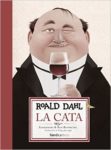Sections: Information | Plot Description
Information
- First published:
- July 25, 1953 issue of The New Yorker
- Also known as:
- Connections:
- Shares characters with “Ah, Sweet Mystery of Life,” “Mr. Hoddy,” “Rummins,” and “The Ratcatcher” (collectively known as the “Claud’s Dog” series from Someone Like You), as well as “The Champion of the World” and “Parson’s Pleasure.”
- Magazine publications:
Plot Description
This is from the “Claud’s Dog” series of stories that were first published in Someone Like You.
Spoiler warning! The narrator Gordon and his friend Claud are exceptionally nervous, because they’re about to pull off the biggest scam of their lives. They’re off to the greyhound racing track with their dog Jackie. Claud knows everything there is to know about greyhound racing, and he’s sure they’ve got a winner. Four months before Claud bought a dog that turned out to be a dead ringer for Jackie, but couldn’t run fast at all. They’ve been running the slow dog at the track for the past eight weeks to make sure that he gets moved into the bottom racing grade. Now they plan on running Jackie and placing all their money on him to win. The only obstacle is Mr. Feasey, who runs the track. He has an incredible memory and is able to spot an imposter dog from a mile away. Once they get to the track, they’re horrified when Mr. Feasey tells them that he doesn’t intend to let them run their “champion” anymore. As a last resort, Claud bets Mr. Feasey a pound that Jackie won’t come in last place. This piques Feasey’s interest, and he inspects the dog closely. Satisfied that it’s the same dog, he accepts the bet and allows Jackie into the first race. While Claud gets Jackie ready and bribes the winder (the man who pulls the rabbit that the dogs chase), Gordon goes down the row of bookies placing bets on Jackie. He stands to win over two thousand pounds. The race begins and Jackie wins easily. Mr. Feasey is furious and tells them that they’re banned from the track in the future. Claud takes Jackie back to the van while Gordon goes to collect their winnings. When he gets there, though, the first bookie won’t pay and says he backed another dog. All the details are in the bookmaker’s book, but he won’t let Gordon see it. None of the other bookies will pay out either. “You’re a thief! A lousy little thief!” Gordon yells. “Well, I never,” says the bookie. “Look who’s talking!” Everyone laughs as Gordon sees Claud waiting for him with a suitcase in hand for the money.


